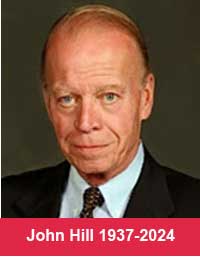Last week, I offered a written elegy, if you will, upon the passing of John Hill at age 86, a friend and great man in the recent history of logistics (See Remembering John Hill.)
John, who passed near his home in Watsonville, CA, was a large influencer in the Warehouse Management (WMS) and Automated Identification and Data Collection (AIDC) systems markets. That included being CEO of one of the pioneering WMS providers, Logisticon, and a invited charter member of the AIDC 100 group. For years, he was a omni-present speaker on these topics at seemingly every industry conference, wielding much clout.
I interviewed John twice for what I called SCDigest’s “Unplugged” series of long form interviews with important people in the supply chain, the first in September of 2003 just a few weeks after the launch of SCD the first week of that month. The second time was in 2015.
Gilmore Says.... |
 |
| Hill noted that "In my experience, supply chain projects failed when users didn't fully do their homework, or skipped important steps in the process" |
 |
What do you say? |
|
| Click here to send us your comments |
| |
|
|
|
I received several emails after last week’s column thanking me for the piece, and a few expressing a desire to see what John’s thoughts were then all these years later.
In the 2003 interview, I asked John for three things companies could do right now to improve their logistics operations. His response:
1. Focus on building total team ownership of any initiative from Day 1.
2. Take a detailed approach to profiling current operations and defining requirements.
3. Recognize that supply chain execution projects [mostly meaning Warehouse Management Systems] require significant resources and budget accordingly.
All three of those still resonate to me, especially the final one, given most WMS projects are still way understaffed, leading inevitably to deployment problems.
So let’s jump forward 12 years to the second interview. Here are highlights.
Knowing he was a strong proponent of RFID, I asked John about what happened to Walmart’s famous “RFD mandate,” a program that never really got of the ground and imploded a few years after it was launched in 2004.
"The Walmart announcement was a watershed event and cost a number of companies a lot of money in terms of preparing for those mandates," Hill said in 2015. "What we wound up with unfortunately were cost and performance issues that I might compare to "square peg-round hole." The technology was not ready at a price point that could be cost justified for the applications Walmart was trying to pursue," leading to the program's demise.”
All true but I think there is even more to discuss on this failure. All these years later, RFID in consumer goods to retail is finally gaining some critical mass.
But Hill noted that the Walmart mandate did lead to huge investments in RFID technology, even though many venture capital firms lost their shirts in the end, and the technology today is far superior to what it would have been otherwise.
We linked back to John’s comments in 2003 on the often challenged deployments of WMS, and I noted it didn’t appear things were much better in 2015.
While offering first some critiques of the WMS vendor community, John said the implementation challenges can about equally be laid at the feet of the adopting companies.
"In my experience, supply chain projects failed when users didn't fully do their homework, or skipped important steps in the process, whether its failing to well define workflows and processes, performance goals, all the needed capabilities, etc.," he said then. "But even when they've done all that, some companies still don't well connect all those requirements to what's in the different WMS packages they are evaluating. It's hard work, but it has to be done correctly, and if it's not it can lead to the kind of deployment pain you referenced."
Well said.
 I didn’t remember this: Towards the end of the interview, I asked John if he had any regrets. I received a surprising answer. I didn’t remember this: Towards the end of the interview, I asked John if he had any regrets. I received a surprising answer.
It had to with an idea he and long-time business partner the late Dave Scott had for a new kind of WMS that never made it to market.
Hill said the concept was for a program into which "a user could input data on current and projected warehouse activity and product mix and volumes, equipment and human resources, and out of the program would pop out alternatives for changing the physical layout of the DC and how to deploy staff to optimize performance."
Then, he said, the program would automatically generate and configure a WMS to execute that plan and manage performance. It would do the same as activity profiles and business conditions changed over time - a sort of "magic WMS" Hill said you might call it.
"We got pretty far with that concept - but then we ran out of money," Hill said. "But someday, I think someone is going to do it, bring such a WMS to the market."
I will say, about 10 years later, there are some efforts in this general direction.
In 2015, I ended by asking John if he was ever going to retire.
"My golf game is no longer good enough to do that - and I'm still having too much fun in "our world" to leave it!"
Alas, time last week won the battle, as it does with all of us.
As I concluded in 2015, I will do again here: “Good guy. Good stuff."
What is your reaction to the death of John Hill? What would you add? Let us know your thought at the Feedback section below.
Your Comments/Feedback
|